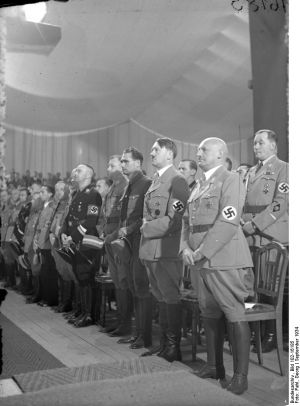Julius Streicher

Streicher, Hitler, Hess and Himmler
Julius Streicher was born on 12 February 1885 in the Upper Bavarian village of Fleinhausen. Julius Streicher was an elementary school teacher by profession, as was his father before him. He served in a Bavarian unit during the First World War, and despite a warning for bad behaviour, received the Iron Cross, First Class, and he rose through the ranks to become a lieutenant. In 1919 he co-
A year later he was elected as a Nazi member of the Bavarian legislature. Streicher was a tireless speaker and plebeian rabble-
After Streicher spoke in Magdeburg in 1935, Jews were barred from using public transport; the general campaign which led to the Nuremberg racial laws in 1935 was initiated by his newspaper. One of Streicher’s most enthusiastic readers was Adolf Hitler, who declared that Der Stuermer was the only paper which he read avidly from first to last page. Undoubtedly the Fuhrer protected Streicher raising him to high office and praising him as the “friend and comrade in arms” who never wavered and would unflinchingly stand behind him in every situation.” Although aware of Streicher’s widespread unpopularity and unsavoury reputation, Hitler regarded him as a man of spirit, extremely useful, if not irreplaceable. He considered the Franconian Gauleiters’ primitive methods to be very effective especially appealing to the ordinary man in the street. Hitler told Hermann Rauschning that he gave Streicher a free hand because anti-
In March 1933 Hitler appointed Streicher “Director of the Central Committee for the Defence against Jewish Atrocity and Boycott Propaganda”. Two months earlier Streicher became a member of the Reichstag for the electoral district of Franconia, and in 1934 he was promoted to SA – Gruppenführer. During his time as Gauleiter he enlarged his newspaper business to prodigious proportions, eventually owning about ten newspapers, including the Frankische Tageszeitung.He further extended his personal fortune by expropriating Jewish property in his district and allowing friends to acquire Jewish homes and businesses at a fraction of their real value. Julius Streicher was corrupt, dishonest, sadistic, obscene and brutal in manner, Streicher’s sexual peccadilloes and his disreputable transactions eventually became intolerable even to his colleagues and by 1939 Party officials were consistently complaining about his psychopathic behaviour. The fact that he had been charged with rape; admitted horsewhipping political prisoners and derided the virility of other Nazi top leaders created a solid front against him that even Hitler could no longer ignore. Streicher’s dismissal from his Nazi Party Posts in 1940 was sealed with his specific allegation that Hermann Goring was impotent and that his daughter had been conceived by artificial insemination. It was Goring who despatched a commission to Franconia to examine Streicher’s business transactions and personal life, which ultimately led to Streicher’s downfall. Nevertheless, Streicher was allowed to continue his anti-
The Nuremburg International Military Tribunal held the view that Streicher’s incitement to murder and extermination, at the time, when Jews in the East were being killed en masse under the most horrible conditions, constituted persecution on political and racial grounds and a crime against humanity. A prison guard at Nuremburg where Streicher was confined after the war, recalled, “The other Nazi prisoners refused to speak him. Whenever women entered the prison, Streicher called out vulgar remarks.” Streicher, however, regarded his own trial and death sentence as “a triumph for world Jewry,” and went to the scaffold shouting angrily, “Purimfest,” and proclaiming his eternal loyalty to Hitler.
SOURCES:
Robert S. Wistrich, Who’s Who in Nazi Germany, Routledge, London and New York 1995
Charles Hamilton, Leaders and Personalities of the Third Reich, R. James Bender 1984
Photograph – Bundesarchiv
© Holocaust Historical Society 2015

